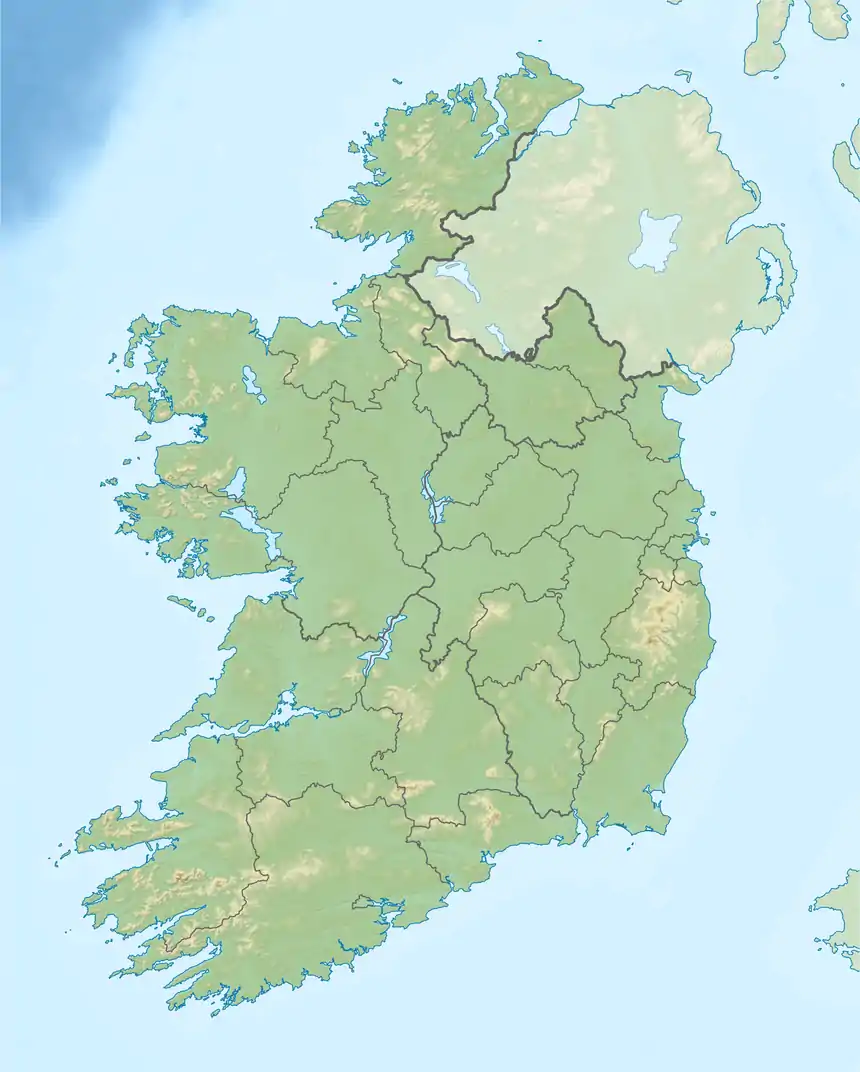Golden Bog of Cullen
The Golden Bog of Cullen is an archaeological site located in County Tipperary, Ireland. Discovered in the 18th century, it has been described as "one of the most important and prolific sites" in Ireland; unfortunately, it was discovered before modern methods of preservation and collection, and almost all of the finds were melted down.[1]
Portach Órga Chuillinn | |
 Shown within Ireland | |
| Location | Longstone, Kilcornan, County Tipperary, Ireland |
|---|---|
| Coordinates | 52.507500°N 8.284449°W |
| Type | peat bog containing gold and brass artefacts |
| History | |
| Cultures | Atlantic Bronze Age |
| Site notes | |
| Public access | no |
Location
The Golden Bog is located 650 metres (0.40 mi) southwest of Cullen, County Tipperary, 1 kilometre (0.62 mi) east of Longstone Rath. This was part of the ancient Gaelic territory of Uí Cuanach (Coonagh).
Artifacts
The earliest recorded find dates to 1731, a two-gallon (9-litre) brass vessel with four legs.
In 1744, a Limerick jeweller bought from a Cullen shopkeeper a gold crown weighing 6 troy ounces (190 g); the metal was of a very high purity.
Objects found on the site included 300 brass swords, a golden cone (described as "the breast of a wooden idol"), bars of pure gold, and gold gorgets.[2][3]
As most of the items were discovered before modern methods of preservation and collection of ancient artefacts, the objects were generally sold to goldsmiths for their bullion value. Only one gold item is known to survive, a dress-fastener or terminal, currently held at the Birmingham Museum and Art Gallery.[4]
History
Eugene O'Curry speculated that the Bog was originally a wooded valley, used by goldsmiths due to its proximity to sources of wood for charcoal, as well as possibly a goldmine. He connected it with the ancient Cerdraigi, a Gaelic tribe whose name derives from cerd, an Old Irish term for a skilled craftsman, especially a worker in gold and silver.[5] He also note the townland of Ballynagard located 5 miles (8.0 km) to the west: in Irish Baile na gCeard, "settlement of the goldsmiths."[6][7]
Their placement in the bog is possibly a form of ritual deposition.[4] The culture that produced and deposited these items is thought to date to c. 2000–400 BC, during the Atlantic Bronze Age.[8]
References
- Wallace, J. N. A. (September 12, 1936). "The golden bog of Cullen, Co. Tipperary, being an account of antique curiosities found there". sources.nli.ie.
- http://www.limerickcity.ie/media/NMAJ%20vol%201%20no%203%2012%20The%20Golden%20Bog%20of%20Cullen,%20by%20J.%20N.%20A.%20Wallace.pdf
- https://cris.brighton.ac.uk/ws/portalfiles/portal/5512720/SAC_Vol_154_Kaminski.pdf
- Cahill, Mary. "A gold dress-fastener from Clohernagh, Co Tipperary and a catalogue of related material" – via www.academia.edu. Cite journal requires
|journal=(help) - "eDIL - Irish Language Dictionary". dil.ie.
- "Baile na gCeard/Ballynagarde". Logainm.ie.
- O'Curry, Eugene (September 12, 1873). "On the Manners and Customs of the Ancient Irish: Lectures and appendix". Williams and Norgate – via Google Books.
- https://aran.library.nuigalway.ie/bitstream/handle/10379/4248/Ritual%20in%20Late%20Bronze%20Age%20Ireland%20(K.%20Leonard%20PhD%20thesis).pdf?sequence=1&isAllowed=y